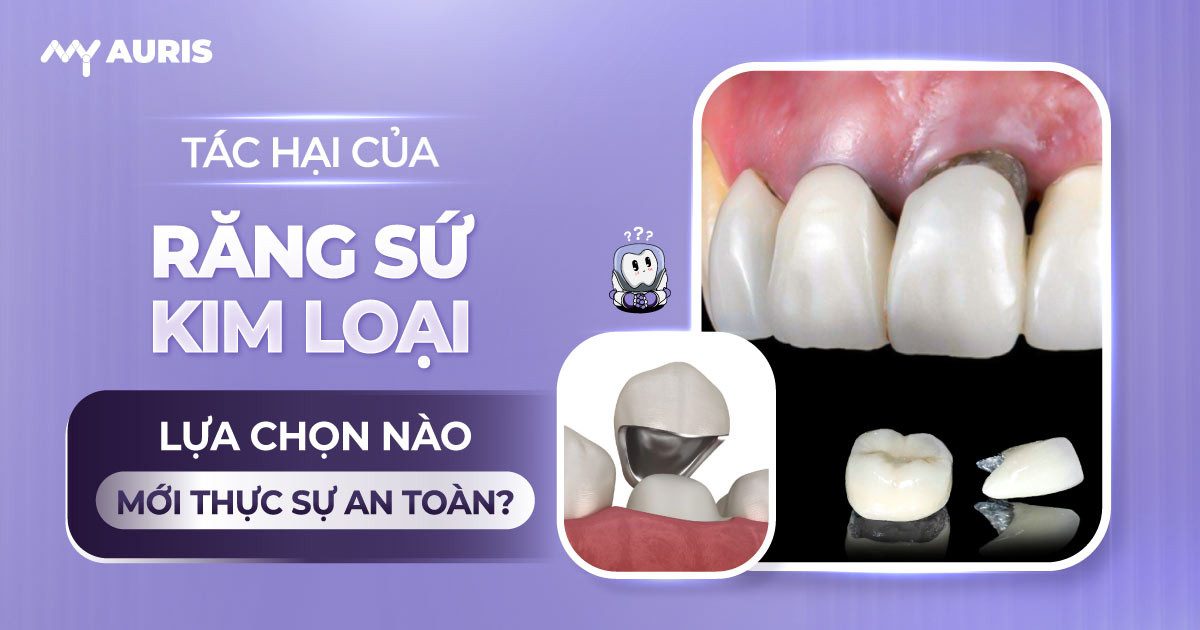Metal porcelain teeth are one of the popular tooth restoration methods, chosen by many people because of their reasonable cost. However, besides the advantages, metal porcelain teeth also have certain potential harms. This article will help you better understand the harmful effects of metal-ceramic teeth, so you can make the most suitable choice for your oral health.
The harmful effects of metal-ceramic teeth should be kept in mind idea
Metal ceramic teeth can cause many harmful effects: First is an allergy, especially for people sensitive to metals such as nickel, cobalt, causing gingivitis, pain, and even anaphylactic shock. In addition, the metal in porcelain teeth can oxidize, darken the gum line, and affect aesthetics. Metal-ceramic teeth easily peel off, causing pain and discomfort. Aesthetically, metal-ceramic teeth have an unnatural color and easily reflect light, creating a gray layer. Furthermore, the use of metal-ceramic teeth can increase the growth of bacteria, leading to gingivitis and other dental problems.
Black tooth edges: Causes, signs, remedies
Cause:
- Metal inside: The metal used in metal ceramic teeth can oxidize over time, creating a black oxide layer. This oxide layer will appear at the root of the tooth, forming a black border.
- Food and beverages: Substances such as tea, coffee, and tobacco can discolor tooth enamel, causing black tooth edges, especially in people using metal-ceramic teeth.
- Poor oral hygiene: Improper and irregular oral hygiene will create conditions for plaque and food to accumulate, causing discoloration of tooth enamel and black edges.
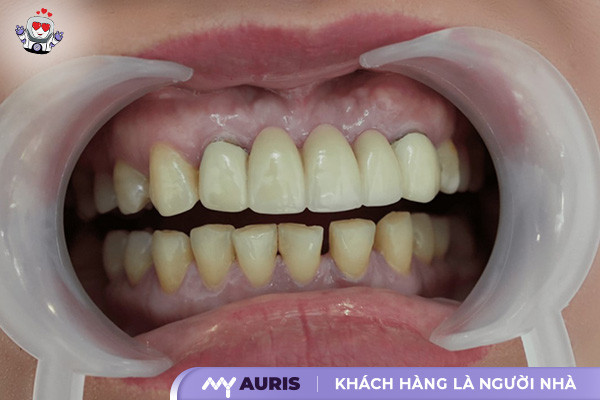
Signs:
- Black border appears at the root of the porcelain tooth
- The black border color becomes increasingly darker over time
- Black edges can spread to the porcelain teeth
How to fix:
- Cleaning porcelain teeth: Porcelain teeth should be cleaned with a soft brush and cream. Brush teeth with fluoride and floss to remove food plaque.
- Teeth whitening: Teeth whitening can help lighten dark edges, but is not very effective and can harm tooth enamel.
- Replace porcelain teeth: If the black edges are too dark and affect the aesthetics, you can consider replacing metal porcelain teeth with other types of porcelain teeth such as all-ceramic porcelain teeth.
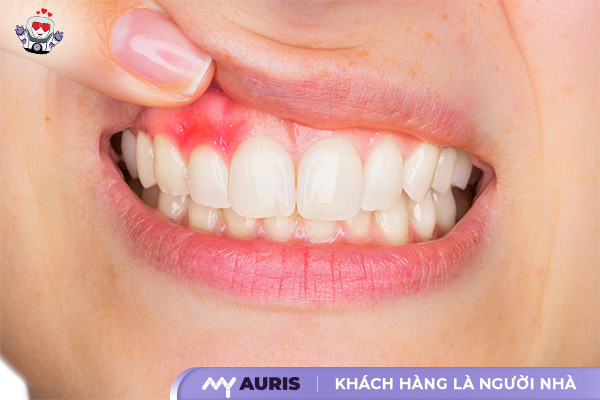
| Symptoms | Consequences | Prevention |
|---|---|---|
| – Red, swollen, painful gums – Bleeding when brushing or flossing – Gums recede, exposing tooth roots – Bad breath |
– Teeth are loose and easily lost – Periodontitis, a serious oral disease – Affects overall health |
– Proper and regular oral hygiene – Regular dental check-ups to check oral health – Use appropriate porcelain teeth and good manufacturing techniques (applicable to cases where teeth are lost and need restoration) |
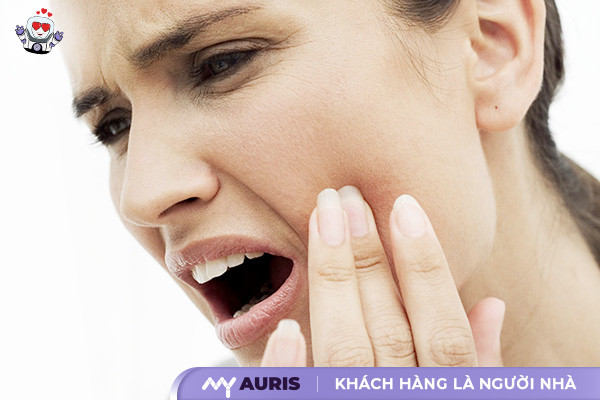
Nickel allergy: Symptoms, dangers, treatment
Manifestation:
- Red, swollen, itchy gums
- Appearance of ulcers in the mouth
- Burning and pain in the porcelain tooth area
- Allergic reactions throughout the body such as rash, itching, difficulty breathing
Danger:
- Nickel allergy can be dangerous to your health, and can even lead to death.
- Nickel allergy can cause many oral health problems, affects chewing function.
How to handle:
- Stop using metal-ceramic teeth and see a dentist immediately.
- The dentist will check and remove the metal ceramic tooth, replacing it with another suitable type of ceramic tooth.
- Use antihistamines to reduce allergy symptoms.
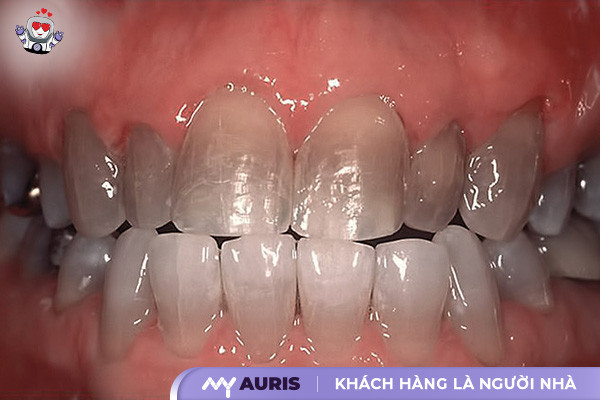
Lead contamination: Causes, effects, ways to control
Causes:
- Lead is a heavy metal that can be found in some types of metal-ceramic teeth.
- Lead can enter the body through direct contact with teeth porcelain, or through saliva when chewing.
Effects:
- Lead is a toxic substance that can affect health, especially in children.
- Lead poisoning can cause many health problems, including:
- Anemia
- Intellectual impairment
- Behavior abnormalities
- Problems carefully
How to control:
- Choose lead-free ceramic teeth.
- Use all-ceramic teeth, zirconia porcelain teeth or Emax porcelain teeth to replace metal-ceramic teeth.
- Clean your teeth regularly to remove plaque and food, and minimize exposure to lead.
Metal material
Metal material used in metal-ceramic teeth is the main cause of harmful effects. Some metals such as nickel and cobalt can cause allergies and adversely affect health.
- Allergenic: Nickel and cobalt are metals that can cause allergies. When exposed to the body, these metals can trigger an immune response, leading to symptoms such as:
- Red, swollen, painful gums
- Periodontal infections
- Skin rash, itching
- Shortness of breath, fatigue
- Fever
- Blackening the gum line: The metal inside porcelain teeth can oxidize, creating metal ions. These ions can penetrate into gum tissue, causing discoloration, causing the gum line to become dark, affecting the aesthetics of the teeth.
- Affects the durability of porcelain teeth: Some types of metal have poor durability and are easily oxidized, leading to porcelain teeth peeling, causing pain and discomfort.
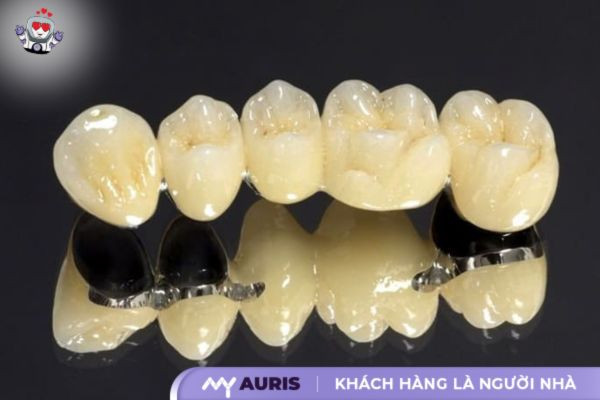
Ceramic tooth making technique
Insecure porcelain tooth making technique is also a cause of harmful effects of metal porcelain teeth.
- Ceramic teeth do not fit tightly to real teeth: If the porcelain tooth making technique is not correct, porcelain teeth may not fit tightly to real teeth, creating space for bacteria to enter, causing infection and tooth decay.
- Peeling porcelain teeth: Insecure porcelain tooth making techniques and poor material quality can lead to peeling porcelain teeth, causing pain and discomfort.
To limit these problems, you should choose a reputable dentist, has a team of good doctors, tmodern equipment to perform dental restoration.
Compare Metal Porcelain Teeth with other types of Porcelain Teeth
Porcelain teeth are a popular tooth restoration solution chosen by many people. Among them, metal porcelain teeth are known for their low cost but also have many potential harms.
All-ceramic teeth: Advantages, disadvantages, cost
All-ceramic teeth are porcelain teeth made entirely from porcelain, containing no metal.
| Criteria | Advantages | Disadvantages |
|---|---|---|
| Aesthetics | • Natural color, transparency like real teeth • Creates a beautiful, natural smile |
|
| Safe for health | • Does not contain metals, does not cause allergies or lead contamination • Does not cause gingivitis or black gum edges |
|
| Durability | • High durability, good load-bearing • Wear-resistant, long-term use |
• Hardness higher than real teeth, can cause erosion of opposing tooth enamel |
| Cost | • Higher price than metal-ceramic teeth (3-7 million VND/tooth) |

Zirconium porcelain teeth: Advantages, disadvantages, cost
Zirconium porcelain teeth are a type of porcelain teeth made from Zirconia, a durable and hard ceramic. high.
| Criteria | Description |
|---|---|
| Advantages | |
| High durability | Zirconia has high hardness, good abrasion resistance, little cracking, lifespan can be up to 20 years. |
| Aesthetics | Can create colors and shapes similar to real teeth, bringing a natural smile. |
| Safe | Contains no metal, does not cause allergies, benign to the body. |
| Disadvantages | |
| Price | Price is higher than metal porcelain teeth and composite porcelain teeth. |
| Gloss | Zirconia has a higher gloss than real teeth, which can cause a slightly fake feeling when viewed up close. |
| Cost | 4,000,000 – 9,000,000 VND/tooth |

Emax porcelain teeth: Advantages, disadvantages, cost
Emax porcelain teeth are porcelain teeth made from lithium disilicate glass ceramic, a ceramic with high transparency and good bearing capacity.
| Criteria | Description |
|---|---|
| Advantages Points | |
| Aesthetics | Transparency and natural color, most similar to real teeth. |
| Durability | Good bearing capacity, effective abrasion resistance. |
| Safety | Does not contain metal, does not cause allergies response. |
| Disadvantages | |
| Price | It is the type of porcelain tooth with the highest price. |
| Hardness | Harder than real teeth, need to be careful when biting and chewing hard foods. |
| Cost | 5 – 12 million VND/tooth |

Precious metal ceramic teeth: Advantages, disadvantages, cost
Precious metal ceramic teeth are porcelain teeth with a frame made from precious metals such as gold, platinum,… and covered with an outer layer of ceramic.
| Criteria | Advantages | Disadvantages |
|---|---|---|
| Durability | – High durability, abrasion resistance good. | |
| Cost | – Lower than all-ceramic teeth and zirconia porcelain teeth (2 – 5 million VND/tooth). |

Composite porcelain teeth: Advantages, disadvantages, cost
Composite porcelain teeth are a type of porcelain tooth made from com resinposite.
| Criteria | Description |
|---|---|
| Advantages | |
| Low price | Composite porcelain teeth have the lowest price among all types of porcelain teeth. |
| Fast implementation | Process Make composite porcelain teeth quickly. |
| Disadvantages | |
| Low durability | Composite porcelain teeth have low durability, are susceptible to abrasion and cracking. |
| Poor aesthetics | The color and shine of composite porcelain teeth are not equal to other types of porcelain teeth. other. |
| Easily discolored | Composite porcelain teeth are easily discolored over time. |
How to care for metal-ceramic teeth
Metal ceramic teeth are one of the popular types of porcelain teeth used in dentistry. This type of porcelain teeth has the advantage of durability and reasonable price, but also has some potential disadvantages such as the ability to cause black edges, metal allergies and affect health. To protect your oral health and keep your smile radiant, taking care of your metal-ceramic teeth scientifically is extremely important.
Brushing your teeth properly
Brushing your teeth properly is the basic step and most importantly in taking care of metal-ceramic teeth.
Below are specific instructions:
- Choose the right toothbrush: You should use a toothbrush with soft bristles and a small head to easily reach between teeth and not scratch tooth enamel.
- Use appropriate toothpaste: Toothpaste containing fluoride protects tooth enamel and prevents cavities.
- How to brush your teeth:
- Brush your teeth in small circles, gently, without scrubbing too hard.
- Brush your teeth at least twice a day, each time for 2 minutes.
- Pay attention to brushing the outside, inside and chewing surfaces of your teeth.
- You should brush your teeth after every meal, especially after eating acidic foods such as fruits and soft drinks.
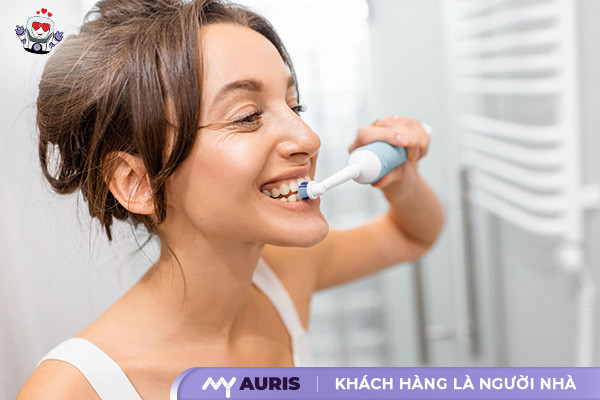
Using dental floss
Using dental floss is an effective way to remove food scraps, plaque and bacteria that accumulate between teeth, where a toothbrush cannot reach.
- How to use:
- Cut a piece of dental floss about 30cm long.
- Thread the dental floss between teeth, gently moving up and down and in a C shape.
- Use a new piece of dental floss for each tooth.
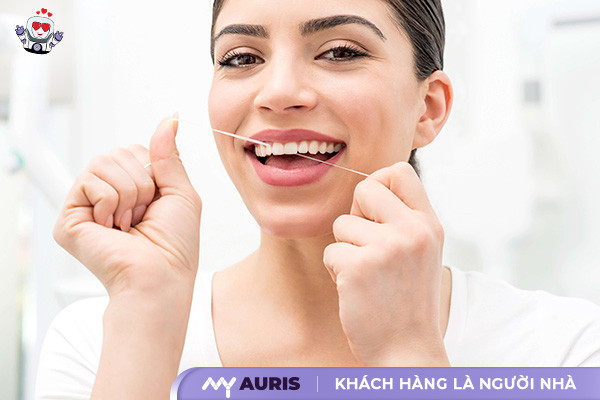
Avoid eating foods hard
Metal ceramic teeth are highly durable, but can also break or crack if exposed to strong impact force.
- Avoid eating hard, chewy foods, such as:
- Crabs, crabs, snails
- Hard fruits like apples and coconuts
- Hard candy, marshmallows
- Hard Bread

Regular check-ups with your dentist
Regular check-ups with a dentist are extremely necessary to monitor oral health, detect unusual problems early and fix them promptly.
- Should have regular dental check-ups every 6 months.
- Check the condition of porcelain teeth, tooth enamel, gums, gums, and other dental diseases.
- The dentist will advise on appropriate oral care and support timely treatment when necessary.
Cost of making metal-ceramic teeth
Factors affecting cost
The cost of making metal-ceramic teeth depends on many factors, including:
- Material type: Metal ceramic teeth can be made from many different types of metals, each with a different price. For example, precious metal ceramic teeth (gold, platinum) will cost more than regular metal ceramic teeth (nickel, cobalt).
- Name of ceramic tooth: Name of ceramic tooth also affects the price. For example, type A metal ceramic teeth will cost more than type B metal ceramic teeth.
- Number of teeth needed: The cost will increase with the number of teeth needed. do.
- Dental practice: Each dentistry has different prices depending on the reputation, equipment, and skill of the doctor.
- The cost of metal-ceramic dental work can vary depending on geographical location. For example, costs in large cities are often higher than in rural areas.
- Examination fee: The examination fee may be calculated separately or included in the total cost.
Average cost
The average cost for a metal-ceramic tooth ranges from 1,500,000 – 3,000,000 VND, depending on the factors mentioned above.
How to save money
- Choose the right type of porcelain teeth: You should choose the type of porcelain teeth that suits your needs and financial ability Compared to all-ceramic teeth, however, it can also cause some harmful effects to health.
- Find a reputable dentist: You should look for a reputable dentist with a team of good doctors and modern equipment to ensure service quality and health safety.
- Consult prices from many dentists: You should compare prices from many different dentists to find the best price.
- Check the contract carefully: You should carefully check the contract before performing the service to avoid incur additional costs.
Dentist specializing in making metal-ceramic teeth
Are you looking for a professional dentist to perform the service of making metal-ceramic teeth? Please read the information provided below to learn more about this type of porcelain teeth, how to choose the right dentist and what to keep in mind before proceeding.
Looking for a reputable dentistcredit
To ensure the safety and effectiveness of metal-ceramic dental work, choosing a reputable dentist is extremely important. Here are some criteria you can rely on to evaluate the quality of a dentist:
- Qualifications and experience: Priority should be given to dentists with specialized degrees in dentistry and long-term experience in the field of porcelain tooth restoration.
- Modern equipment: Dentistry uses modern technology to ensure accuracy and safety for dental work.
- Reputation and feedback from customers: Find out about the dentist’s reputation and feedback from previous customers to get an objective assessment.
- Professional service: Professional dentists will give dedicated advice, explain clearly and meet all customer needs.
In addition, you can also consult friends, relatives or search for information on reputable dental forums and websites. credit.

Consult before doing teeth
Before deciding to make metal-ceramic teeth, you should talk to your dentist to get clear advice about:
- Current dental condition: The dentist will check your dental condition to determine whether you are suitable for this type of porcelain crown or not.
- Advantages and disadvantages of metal-ceramic teeth: The dentist will clearly explain the advantages and disadvantages of metal-ceramic teeth, possible side effects and how to overcome them.
- Procedure: The dentist will introduce details about the dental procedure, duration and necessary steps.
- Cost: The dentist will provide clear information about the cost of dental work, including medical examination and treatment costs, materials and other services.
Ask the dentist questions to clearly understand this type of porcelain tooth before making a decision.
Choose a dentist that suits your needs
To choose the right dentist for your needs, consider the following factors:
- Experience: Look for a dentist with many years of experience in the field of porcelain tooth restoration, especially metal porcelain teeth.
- Technique: You should choose a dentist who uses advanced techniques, ensuring accuracy and aesthetics for porcelain teeth.
- Attitude: The dentist has a professional, dedicated attitude and clearly explains to you about the service.
- Cost: Compare the prices of different dentists to choose the one that suits your financial ability.
Frequently asked questions about metal-ceramic teeth type
Metal ceramic teeth are one of the popular types of porcelain teeth used in dentistry. This type of tooth is made of an inner metal layer and an outer ceramic layer. Metal-ceramic teeth have many advantages such as high durability and low cost, but also have some disadvantages.
Do metal-ceramic teeth cause cancer?
To date, there is no scientific evidence that metal-ceramic teeth can cause cancer.
Studies show that metals used in metal-ceramic teeth such as gold, silver, nickel, cobalt… have been tested and certified to be safe for human health. However, in rare cases, allergies to certain metals may occur. If you have a history of allergy to metals, notify your dentist before deciding to have metal porcelain teeth.
Are metal porcelain teeth durable?
Ceramic teeth Metal is considered the most durable type of porcelain teeth among the current types of porcelain teeth. The inner metal layer helps increase the hardness and strength of porcelain teeth. This helps metal-ceramic teeth withstand strong chewing forces and are less likely to break or chip than other types of porcelain teeth.
However, the durability of metal-ceramic teeth also depends on many factors such as manufacturing techniques, material quality, and your oral care habits.
Do metal-ceramic teeth affect overall health?
In general, metal-ceramic teeth do not have a negative effect on overall health. However, in some cases there may be an allergy to the metal used in porcelain teeth.
Allergy to metal can cause symptoms such as gingivitis, toothache, black tooth edges, and infection.lead… If you experience these symptoms, contact your dentist for timely examination and treatment.
Do metal-ceramic teeth need to be replaced after a period of time?
Depending on the quality of materials, manufacturing techniques and your oral care habits, metal-ceramic teeth can last from 10 to 15 years. After a long period of use, porcelain teeth can wear out, break, peel off the porcelain layer, or have blackened tooth edges.
At that time, you need to go to a dentist to check and replace new porcelain teeth.
Do metal ceramic teeth cause pain?
Metal ceramic teeth usually do not cause pain, but in some cases, you may feel pain after porcelain teeth.
The cause of pain may be:
- Gingivitis:Gingivitis is an inflammatory reaction of the gums when the body reacts to porcelain tooth material.
- Manufacturing technique: If the technique of making porcelain teeth is not good, the porcelain teeth can become misaligned, causing friction on the gums, leading to pain.
- Allergy: Allergy to metal in porcelain teeth can also cause pain, swelling, and even bleeding gums.
Metal ceramic teeth bring many potential harmful effects to oral health and aesthetics. Choosing the right type of porcelain teeth is extremely important to protect your radiant smile and long-term oral health. My Auris Dental Clinic, with the motto “Customers are family”, always strives to bring customers the optimal and safest solutions. Please contact us for advice and to choose the most suitable type of porcelain teeth for yourself.
Thu Lieu – Duong Duong


